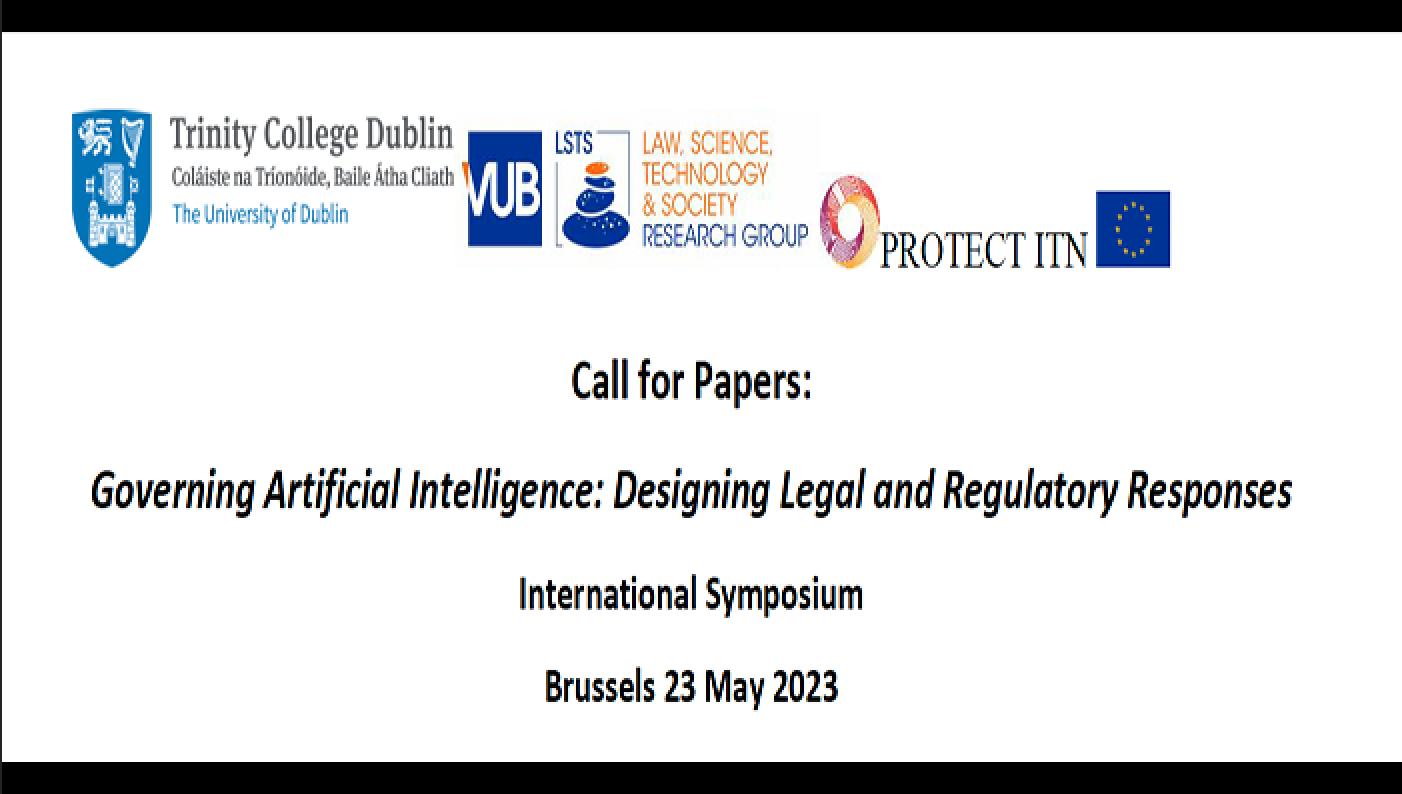Governing Artificial Intelligence: Designing Legal and Regulatory Responses - Call for Papers
International Symposium: Brussels, Wednesday 23 May 2023.
This International Symposium is co-organised by PROTECT PhD Training network, Technologies, Law and Society Research Group, School of Law, Trinity College Dublin and Law, Science, Technology and Society Research Group, Faculty of Law and Criminology, Vrije Universiteit Brussel.
The Technologies, Law and Society Group in the School of Law, Trinity College Dublin is collaborating with the MSCA PROTECT PhD Training network and the Law, Science, Technology and Society Research Group of the Faculty of Law and Criminology, Vrije Universiteit Brussel in organising this one-day symposium in Brussels on addressing the global challenge presented by the growing impact of artificial intelligence (‘AI’) on business, society, and the world of work.
Symposium Objectives
The symposium aims at examining the legal and regulatory challenges posed in the fourth industrial revolution by the advent of AI. Contributors to the symposium will seek to engage creatively with the benefits offered by AI, dangers posed and potential legal and regulatory approaches. AI brings unparalleled opportunities but significant ethical, legal, and regulatory challenges, raising issues that frequently transcend national boundaries. Algorithmic engagement with big data, machine learning, autonomous vehicles, and robo-advisors (to name but a few) are challenging incumbent practices and firms. This evolution gives rise to new issues which hold significance, not just for private parties, but for governments, legislators, regulators, policymakers, and courts and, more broadly, for how fields of law respond to AI’s emergence. Can law and regulation be optimised to address the challenges posed without unduly stifling innovation?
Paper Topics
Papers for this symposium on Governing Artificial Intelligence: Designing Legal and Regulatory Responses are invited on a broad range of topics relating to AI and its regulation including examination of the potential impact of AI on any field of law. International and comparative perspectives are welcomed. Sample topics broadly include, but are not limited to:
- Liability issues surrounding AI deployment;
- Ethical issues surrounding AI;
- Algorithmic bias;
- Regulatory modalities for AI including regulatory sandboxes;
- AI in the context of financial services law;
- AI and corporate governance;
- Competition law issues concerning AI and algorithms;
- Big data, data privacy, data security, cyber-resilience;
- AI and intellectual property;
- RegTech and SupTech.
- Technical tools and frameworks for engaging with AI developers and stakeholders
- Data solutions, computing and technical aspects.
Procedure for Submitting Abstracts
We welcome submissions from scholars at all career stages from doctoral students to senior scholars. Intending participants are invited to submit an abstract (maximum 500 words) Submissions are made through EasyChair.
The deadline for submission is 18.00 hours (Central European Time) Friday 7 April 2023.
Submissions will be considered by the Conference Committee and decisions on acceptance will be communicated by 14 April 2023. Presentations will be organised into chaired panels and the presentation time for each participant will be 20 minutes. For more technical presentation the option to participate in a poster/demo session will also be available. Subsequent submission of full papers is not required. Participants should note that they will be required to fund their own travel and accommodation expenses.
Symposium Venue
The symposium will take place at Vrije Universiteit Brussel (VUB)’s Etterbeek campus, in the U-Residence, located in Generaal Jacqueslaan 271, 1050 Elsene, Brussels.
The building is right next to VUB entrance No. 9
Further information on how to get there is enclosed in the PDF attachment.
Further information on each Research Group can be found in the PDF attachment.


